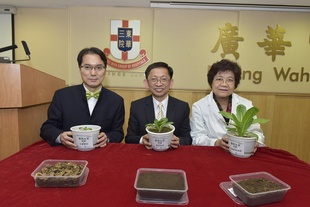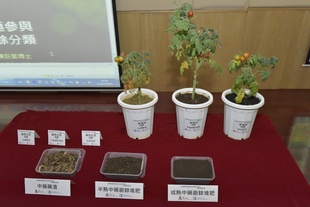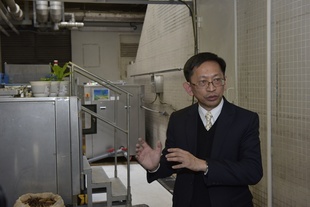HKBU and TWGHs jointly develop innovative food waste compost with biopesticide properties by adding Chinese medicine herbal residue as bulking agent
The Sino-Forest Applied Research Centre for Pearl River Delta Environment of Hong Kong Baptist University (ARCPE) and the Tung Wah Group of Hospitals (TWGHs) have been collaborating since 2013 to improve the efficacy of community food waste composter performance through the use of Chinese medicinal herbal residue as bulking agent in the food waste composting process. The compost produced is effective in pest control due to the presence of natural bioactive compounds. The latest results showed that the compost enhanced plant growth by reducing fungal pathogens by more than 99% when it was applied to plants inoculated with pathogenic fungal populations. This is the first report in the world of a “biopesticide compost derived from Chinese medicinal herbal residue” being produced and is expected to have tremendous market potential.
According to the study, the optimised composting mix of 1:1:0.5 ratio (on dry weight basis) of Chinese medicinal herbal residue: food waste: saw dust effectively reduced the composting time from 8-9 weeks to 5 weeks. Moreover, the temperature of the composter could be maintained between 60 to 70°C throughout the composting period, meeting the new EU requirement on compost temperature which was proposed to ensure sufficient heat to kill the pathogens. At such high temperatures, the problem of fat, oil and grease could also be effectively alleviated. The quality of the final product also meets the requirement for “Organic Farming” set by the HKBU’s Hong Kong Organic Resource Centre.
In addition, the results showed that Chinese medicinal herbal residue helped boost the bulking condition of compost and its antipathogenic effects. Growth experiments using tomato and Chinese cabbage plants that received Chinese medicinal herbal residue derived compost demonstrated antipathogenic effects and inhibition of two fungal pathogens. About 22 bioactive compounds were found in the compost that contained herbal residues, and seven of these compounds belonging to the groups alkaloids, flavonoids and coumarins were present in significant quantities. These compounds killed bacteria and fungal pathogens. When the compost was applied to tomato and Chinese cabbage plants inoculated with Alternaria solani and Fusarium oxysporum, the pathogenic fungal population was reduced by more than 99% resulting in enhanced plant growth and protection against diseases. A 5% compost application enhanced the biomass by 3.16 and 1.28-fold for tomato plants, and 2.42 and 2.21-fold for Chinese cabbage plants when compared with the control and regular food waste compost, respectively, demonstrating the ability of this product in suppressing fungal pathogens.
Professor Jonathan Wong, Director of ARCPE and the project-in-charge of this study, said that this is the first report in the world of producing compost with biopesticide properties by incorporating Chinese medicinal herbal residue into food waste compost. He said that the new compost could be a potential “organic fertiliser” for organic farming where the use of synthetic fertilisers is prohibited. The recycling of organic resources including food waste and Chinese herbal residue through composting is contributive to the exigent food waste problem in Hong Kong. Professor Wong believed that the application potential of the biopesticide compost is important in crop production as it reduces the reliance on artificial pesticides and fertilisers, and the compost produced has strong market potential locally and internationally.
Dr Eric Chan, Kwong Wah Hospital Senior Project Facility Manager/Green Convenor, said that recycling of food waste through composting is a sustainable waste management strategy, and can be adopted as one of the proposals in resolving the food waste problems in Hong Kong. Dr Chan appreciated the efforts made by TWGHs to fulfil its corporate responsibility and shared that Kwong Wah Hospital has been actively implementing environmental protection initiatives. He said this partnership project is of particular importance to Hong Kong’s sustainable development.
Professor Li Handong, Centre Manager of Kwong Wah Hospital – The Chinese University of Hong Kong Chinese Medicine Clinical Research and Services Centre said that the increasing demand for the hospital’s traditional Chinese medicine service led to the subsequent generation of herbal residues. Client population of Chinese medicine service in Kwong Wah Hospital has risen nearly 60% in the past four years. In the same period, decocting services has increased 40%, giving a daily yield of 160 kg of Chinese medicinal herbal residue. Hence, finding an effective method to deal with the residues became a critical issue and this study has unveiled a potential use for the end product. With the new technology, the residue enhanced the bulking condition of compost, thereby reducing waste while producing antipathogenic compost.
Currently, about 3,600 tonnes of food waste reaches landfills in Hong Kong every day, representing about 40% of the municipal solid waste generated. Apart from occupying precious space, organic waste also impacts the environment. In 2011, the Environmental Protection Department initiated a “Food Waste Recycling Project in Housing Estates” to educate the public on food waste separation and the use of electric composter for in-situ composting of separated food waste at housing estates. However, the performance of the composter operations is far from satisfactory as there is the problem of emission of odour, poor degradation and production of immature compost which is not suitable for direct application to soil. One of the major problems is the inadequate bulking materials used to maintain free air space to facilitate good aeration for microbial activity. In addition, it is found that some composters are merely dehydrators and the output is not suitable for agricultural applications.
| Ms. Jenny HO Corporate Communications Branch Tung Wah Group of HospitalsTel: (852) 2859 7857 Email: jenny.ho@tungwah.org.hk |
Ms. Tina Ng Communication and Public Relations Office Hong Kong Baptist UniversityTel: (852) 3411 5262 / 7472 2122 Email: tina@hkbu.edu.hk |

(From left to right) Dr Eric Chan, Professor Jonathan Wong and Professor Li Handong share their experience and release the latest research outcome.

Three pot tomato which had been treated with (from left) soil with fertiliser, Chinese medicinal herbal residue compost and normal food waste compost.

Professor Jonathan Wong demonstrates the use of Chinese medicinal herbal residue as bulking agent during a food waste composting process.



